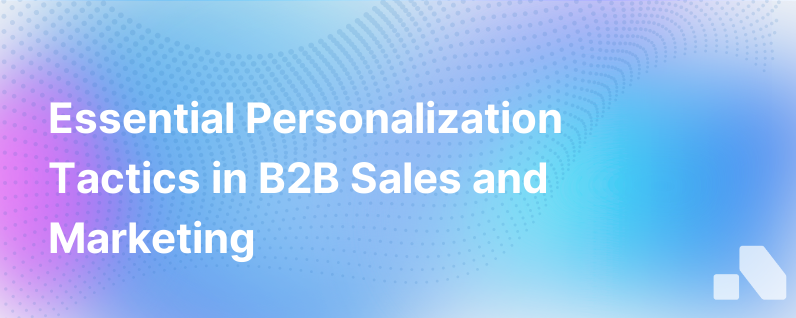
In the vast and competitive field of B2B sales and marketing, one truth has come to stand out above others: Personalization isn't just nice to have, it is unequivocally a must-have. With the advent of sophisticated data analytics and artificial intelligence, personalization has leapt from being a mere catchphrase to becoming the backbone of successful B2B strategies. Today's business customers expect individualized experiences tailored to their needs and pain points. The days of one-size-fits-all marketing are melting into the shadows of the past.
The Evolution of B2B Personalization
Not so long ago, personalization in B2B was rigid, limited to addressing decision-makers by name or industry. In those days, broad segmentation strategies segmented markets into crude slices. But, as markets evolved, so did the need for a more granular approach. Now, in our era, striking a chord with prospects requires a symphony of data harmonizing perfectly to produce an orchestrated and individualized user experience. Personalization has shifted from a mere accessory in our strategic toolkit to the engine of growth.
Why Highly Personalized B2B Sales and Marketing Matters
To Stand Out in a Sea of Sameness: The B2B landscape is saturated. Differentiation is essential, and mass campaigns that broadcast to all corners often fall on deaf ears. Customized interactions set a brand apart, carving out a unique space that connects more potently with prospects.
To Better Align with Customer Expectations: With increased access to information, customers in the B2B domain are more informed and discerning. They expect the businesses they engage with to understand their specific challenges and provide bespoke solutions. Personalization attends to this expectation, delivering information that caters directly to individual needs.
To Increase Engagement and Conversion Rates: Engagement metrics improve drastically when messaging aligns directly with a recipient's role, industry or specific business problem. Personalization elevates the relevance of communication, which in turn, lifts the propensity for engagement and conversion. It's simple, the more a message resonates with an individual, the more likely they are to react positively.
For Enhanced Account-Based Marketing (ABM): ABM is inherently a personalized strategy, targeting high-value accounts with tailored messaging and campaigns. The granularity of personalization in ABM campaigns is often deeper, drilling into account specifics and leveraging insights for one-to-one or one-to-few communications.
Key Strategies for Highly Personalized B2B Sales and Marketing
Employ Data-Driven Insights: Personalization begins with data. Harvesting and analyzing data from CRM platforms, website interactions, and customer feedback helps paint a vivid picture of customer preferences and behaviors. Use these insights to segment audiences and tailor messaging to each segment's peculiarities.
Craft Tailored Content: Content should address the unique challenges and needs of each customer or segment. This might range from personalized emails and customized videos to targeted resources like whitepapers and e-books that resonate with specific pain points.
Utilize AI and Automation: Leverage AI for predictive analytics, determining what customers might need before they inquire. This forward-thinking approach allows for timely and relevant interactions. Automation tools also ensure the scalability of personalized campaigns, delivering customized communications at scale without sacrificing the human touch.
Adopt Account-Based Marketing Tactics: In higher-stakes deals or when targeting enterprise accounts, adopt ABM practices. Customize not just to the industry or company but to individual key players within an organization, considering their role, influence and specific business goals.
Engage across Multiple Channels: Integrate personalization throughout the customer journey across multiple channels – social media, email, web, phone, and in-person interactions. Omni-channel personalization ensures a seamless and consistent experience, reinforcing your message and value proposition.
Measure and Optimize Continuously: Personalization isn't set-it-and-forget-it. It requires ongoing analysis and optimization. Measure how tailored strategies perform and refine them continuously, making improvements based on customer feedback and behavioral data.
Personalization in Action: Real-World Examples
Consider the global information technology company that employs powerful data analytics to serve up personalized website experiences with content reflecting each visitor’s industry and business size. Or a cloud services provider that uses machine learning to recommend specific products to customers based on their digital footprints and past purchases.
On the sales side, envision a SaaS platform providing demos tailored to the unique challenges of each prospective customer, effectively demonstrating how their solution fits into the prospect's existing processes and addresses their specific pains.
The Role of Technology in Personalization
The depth of personalization required today is not feasible at scale without technology. From CRMs with segmentation capabilities to AI-enhanced analytics platforms and machine learning tools, technology is the lynchpin in the shift to personalized B2B experiences. It allows us to knit together customer data, draw actionable insights, deliver tailored content, and ultimately, craft experiences that resonate on a personal level.
For sales and marketing professionals in the B2B sphere, adopting technologies that facilitate such personalization is imperative for remaining competitive. Machine learning algorithms can predict buying intent, personalize communication in real-time, and automate many behind-the-scenes tasks to curate individualized content.
Conclusion
Approaching B2B sales and marketing without a personalization strategy is now equivalent to setting sail without a compass. The market's complexity, coupled with customers' elevated expectations for relevant dialogue, demands that we provide our prospective and existing clients with tailored experiences. Highly personalized B2B sales and marketing are not just a passing trend but a profound evolution of the space, transforming the very fabric of customer engagement. It is an attribute that today's businesses cannot afford to neglect. As organizations rise to this challenge, they will find within personalization the key to unlocking higher response rates, deeper loyalty, and ultimately, sustained success.